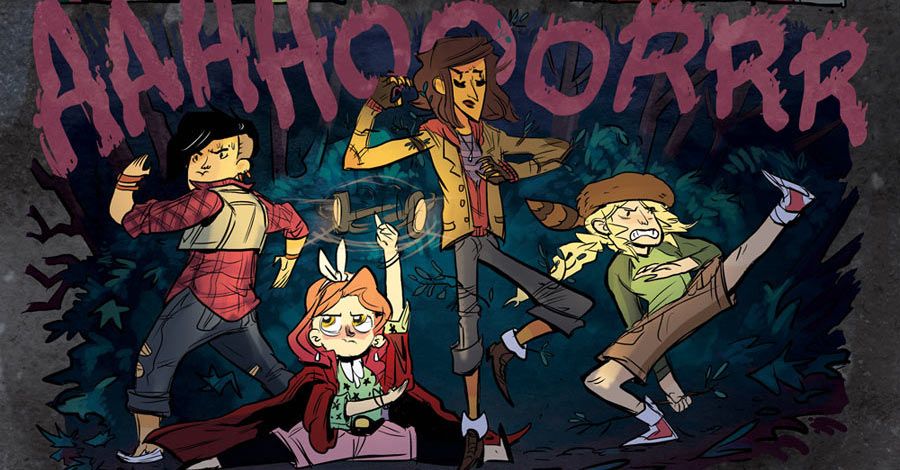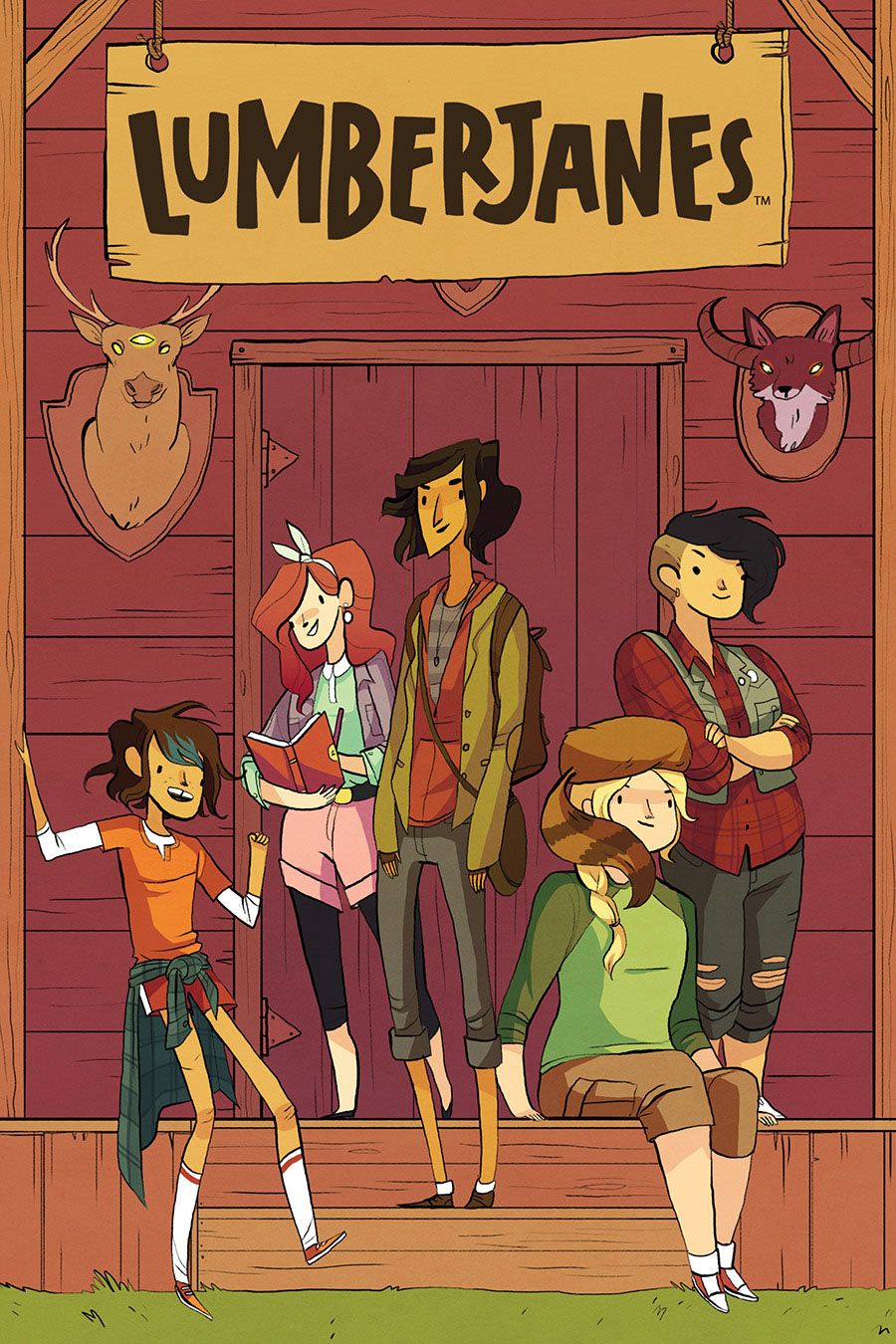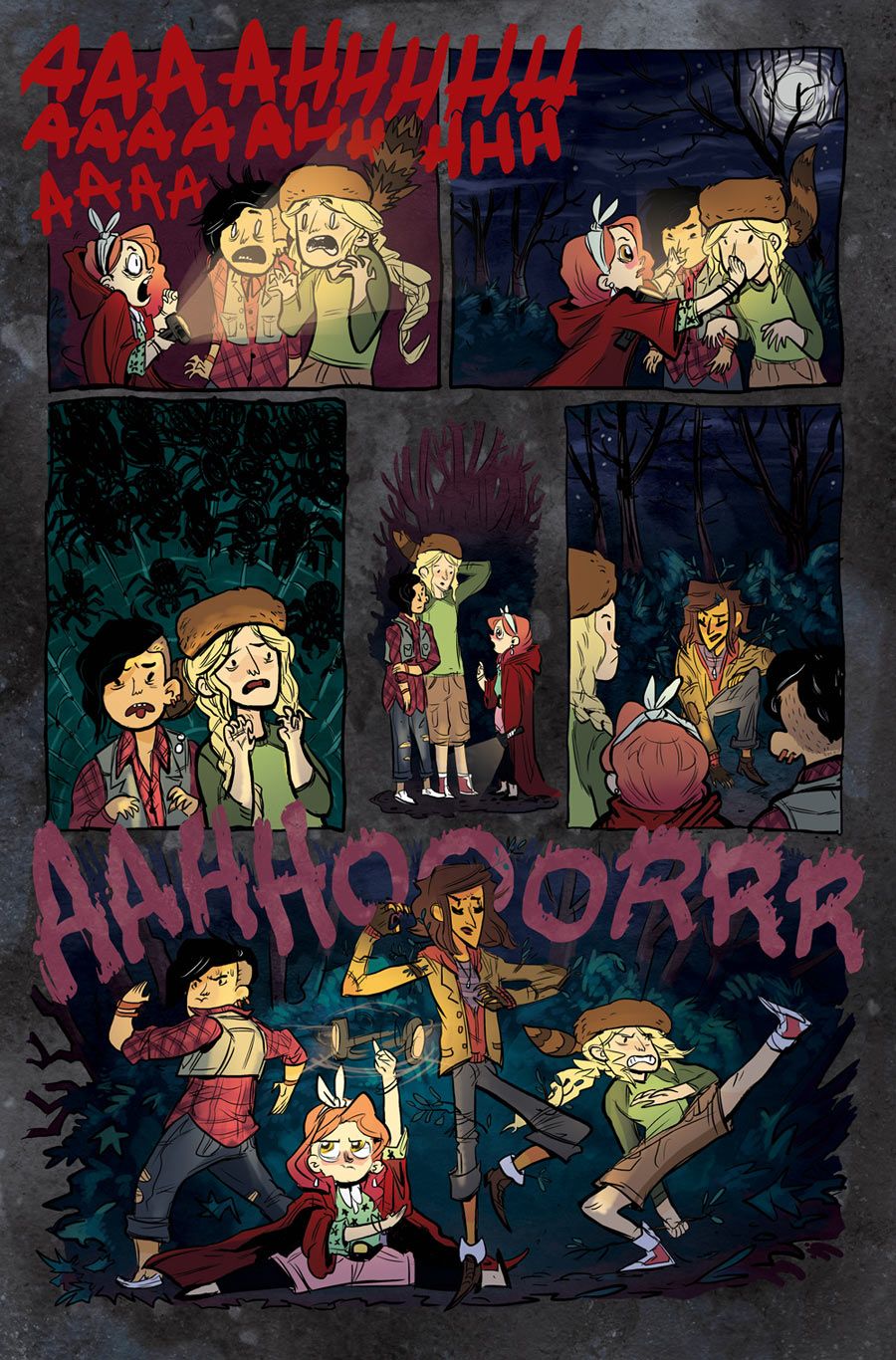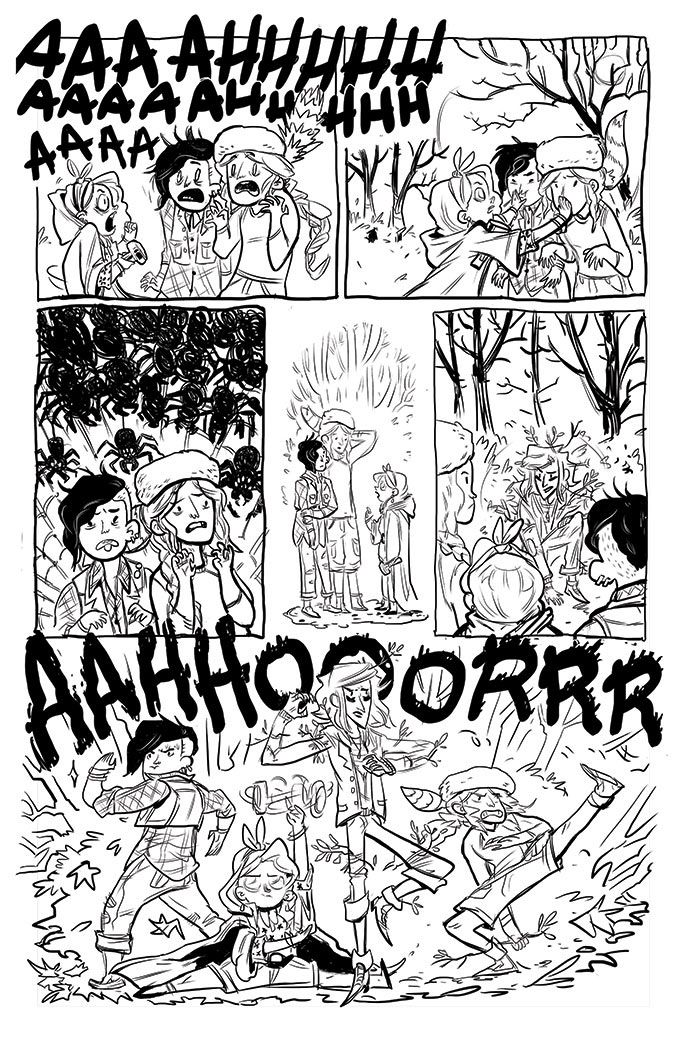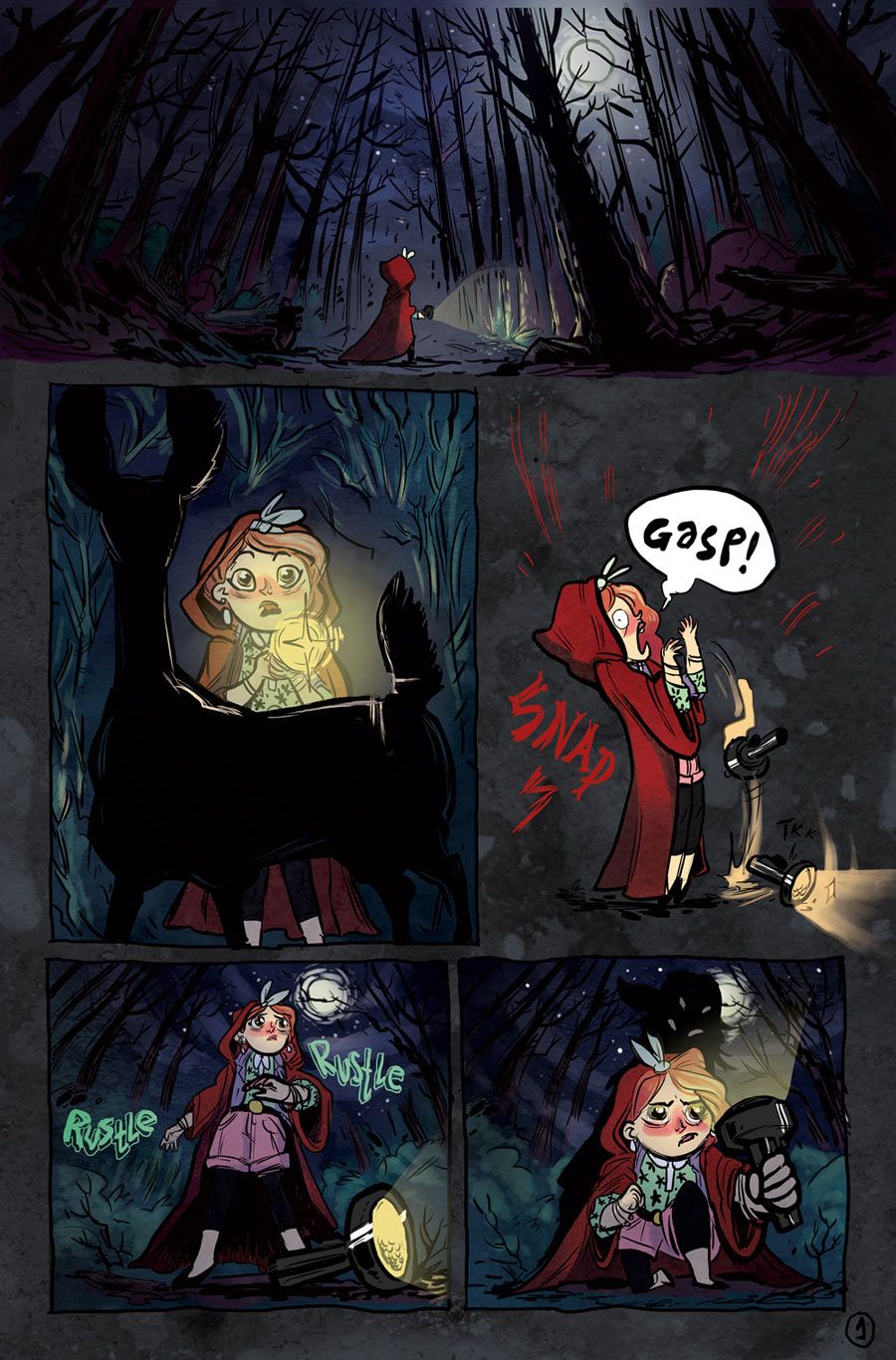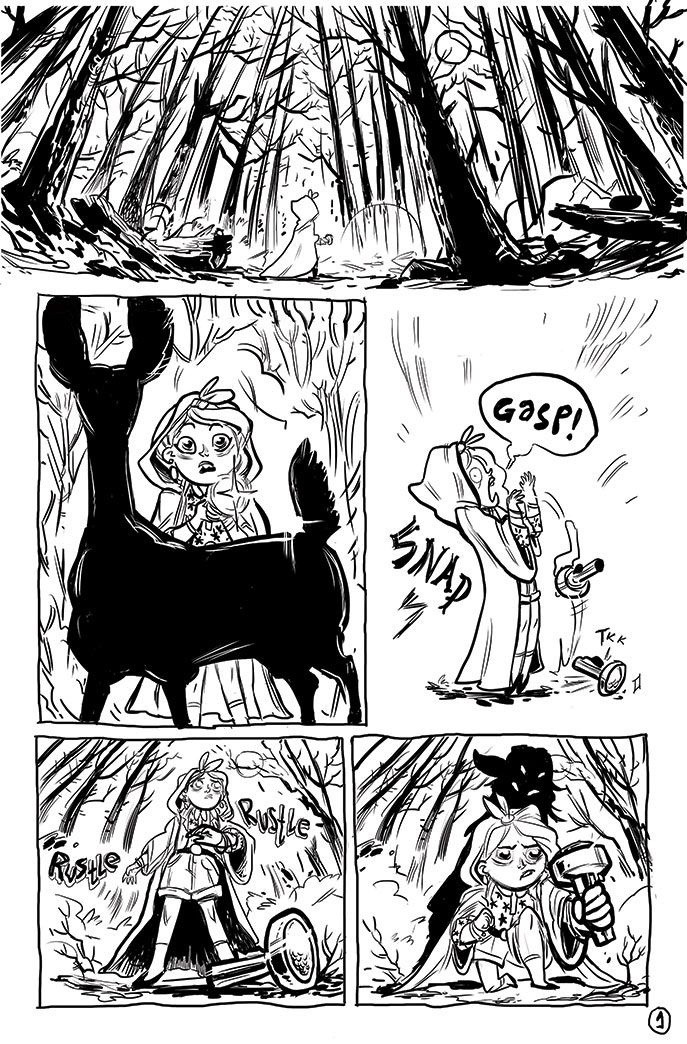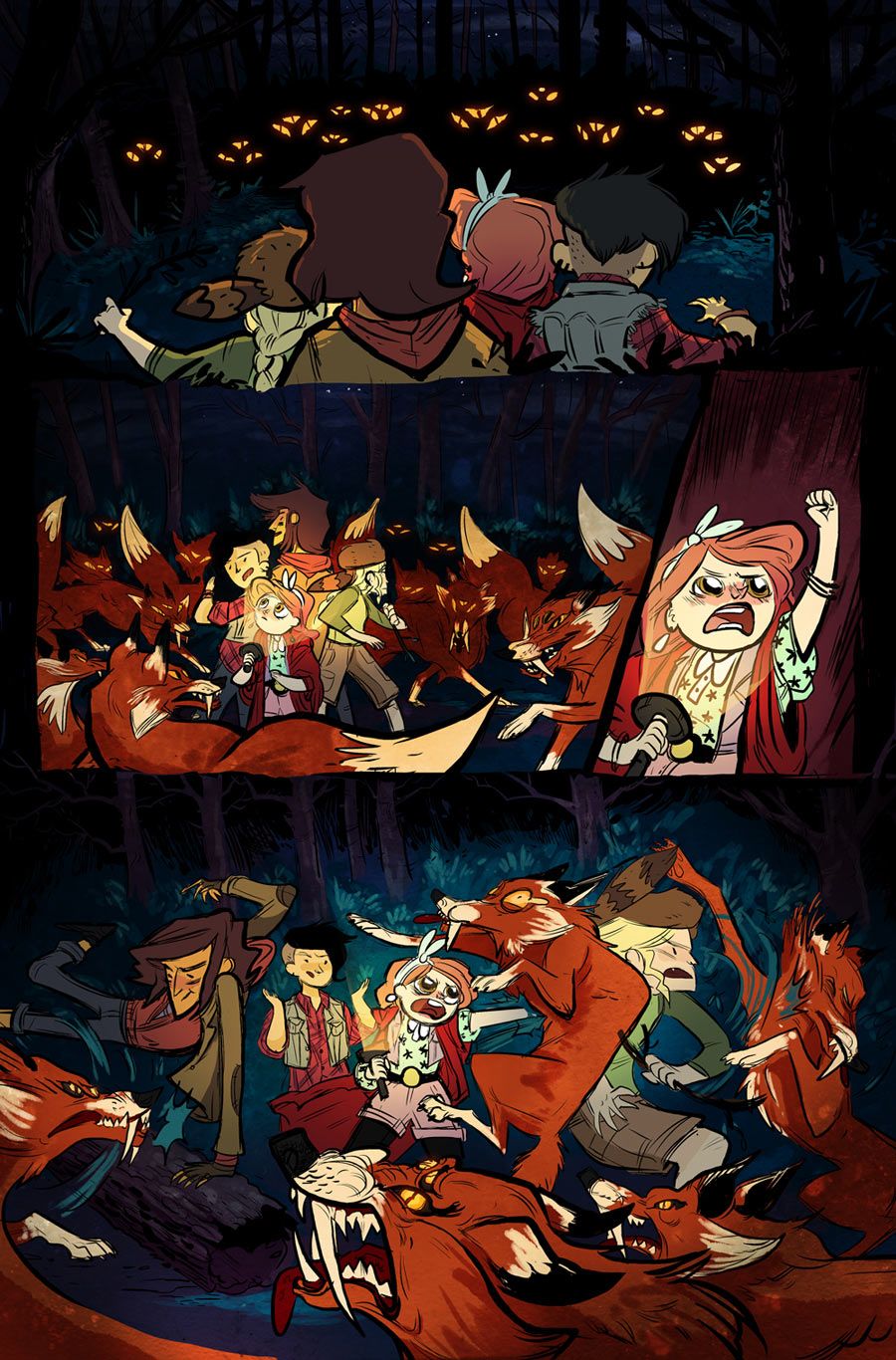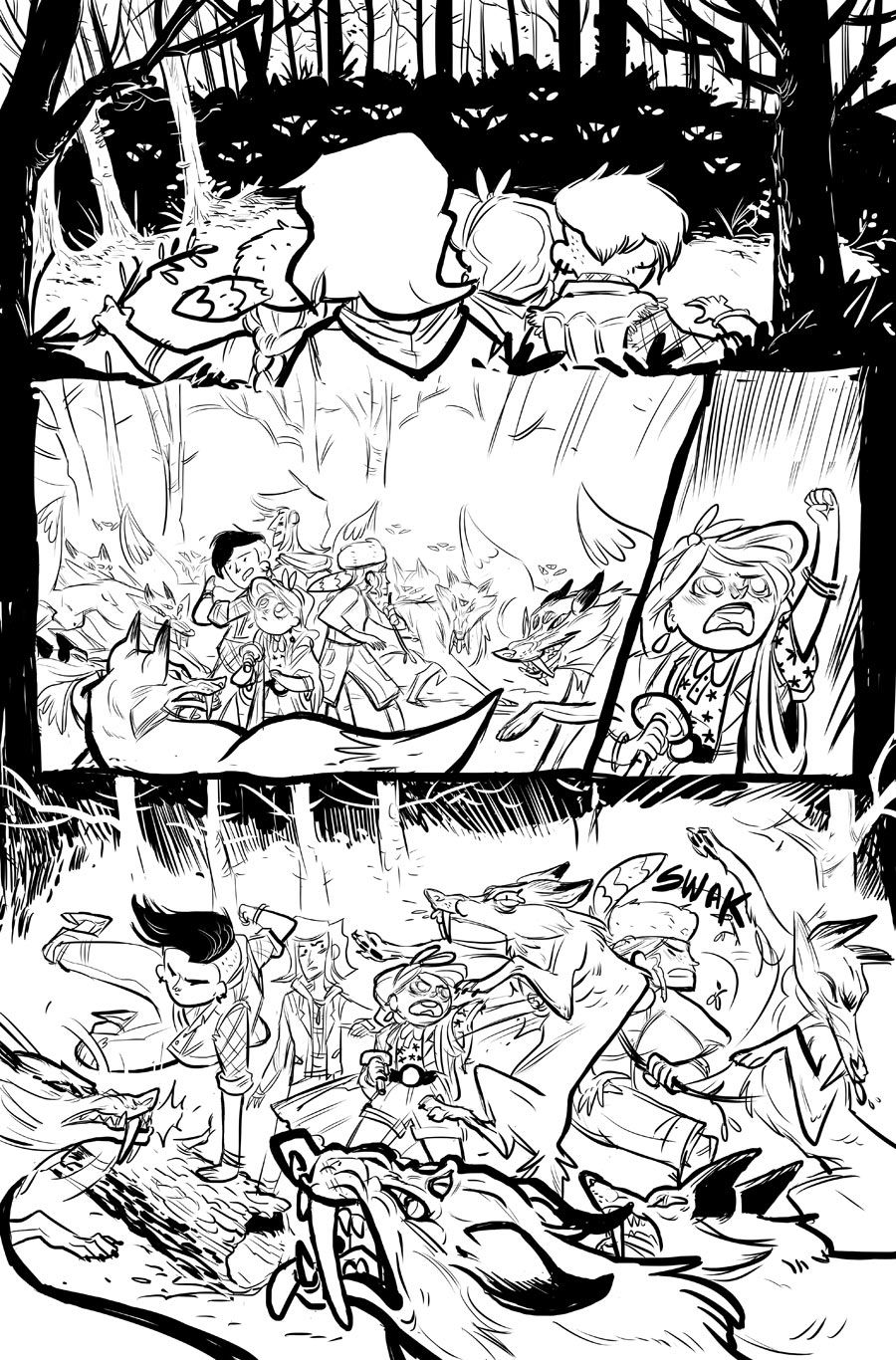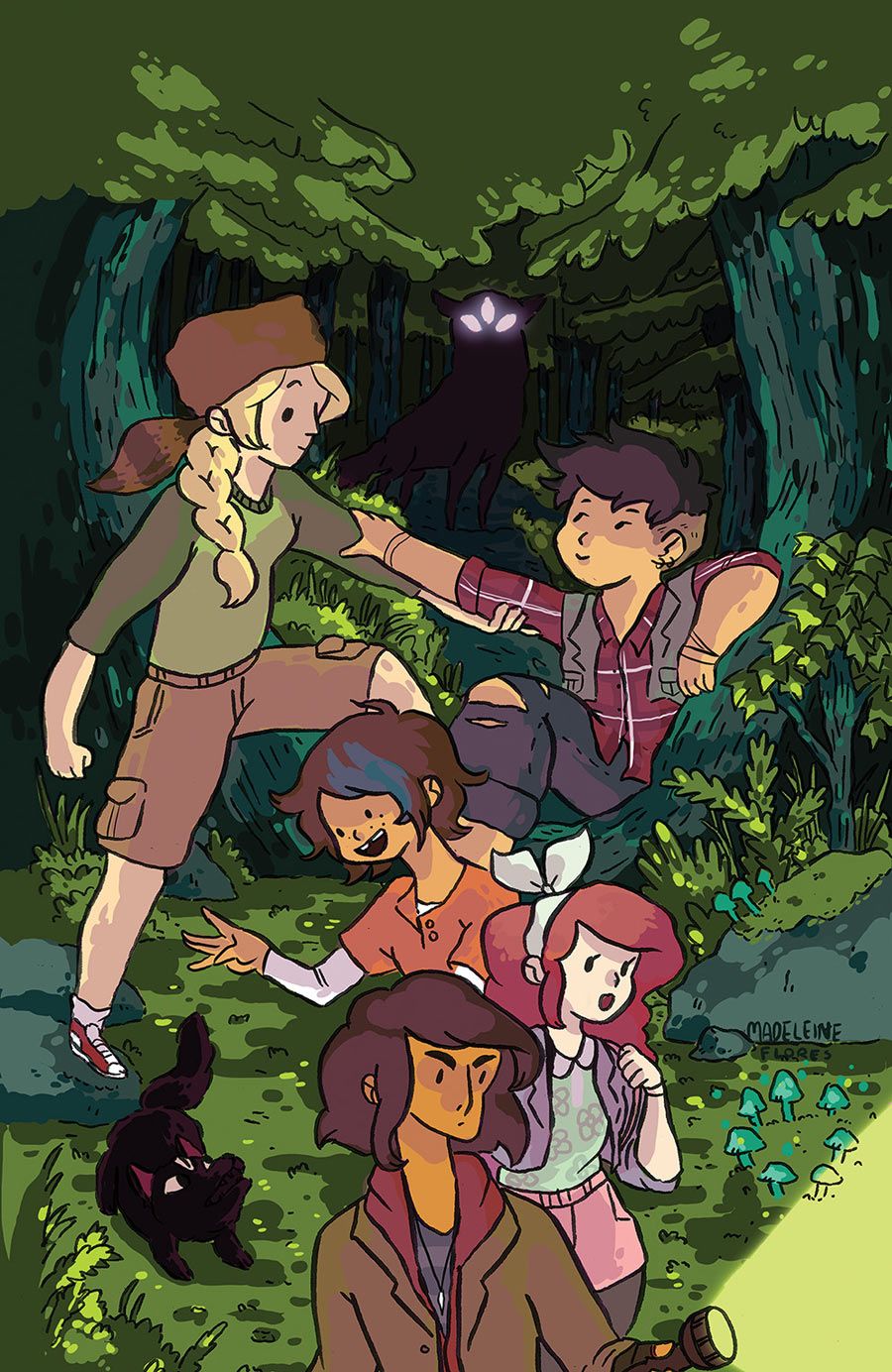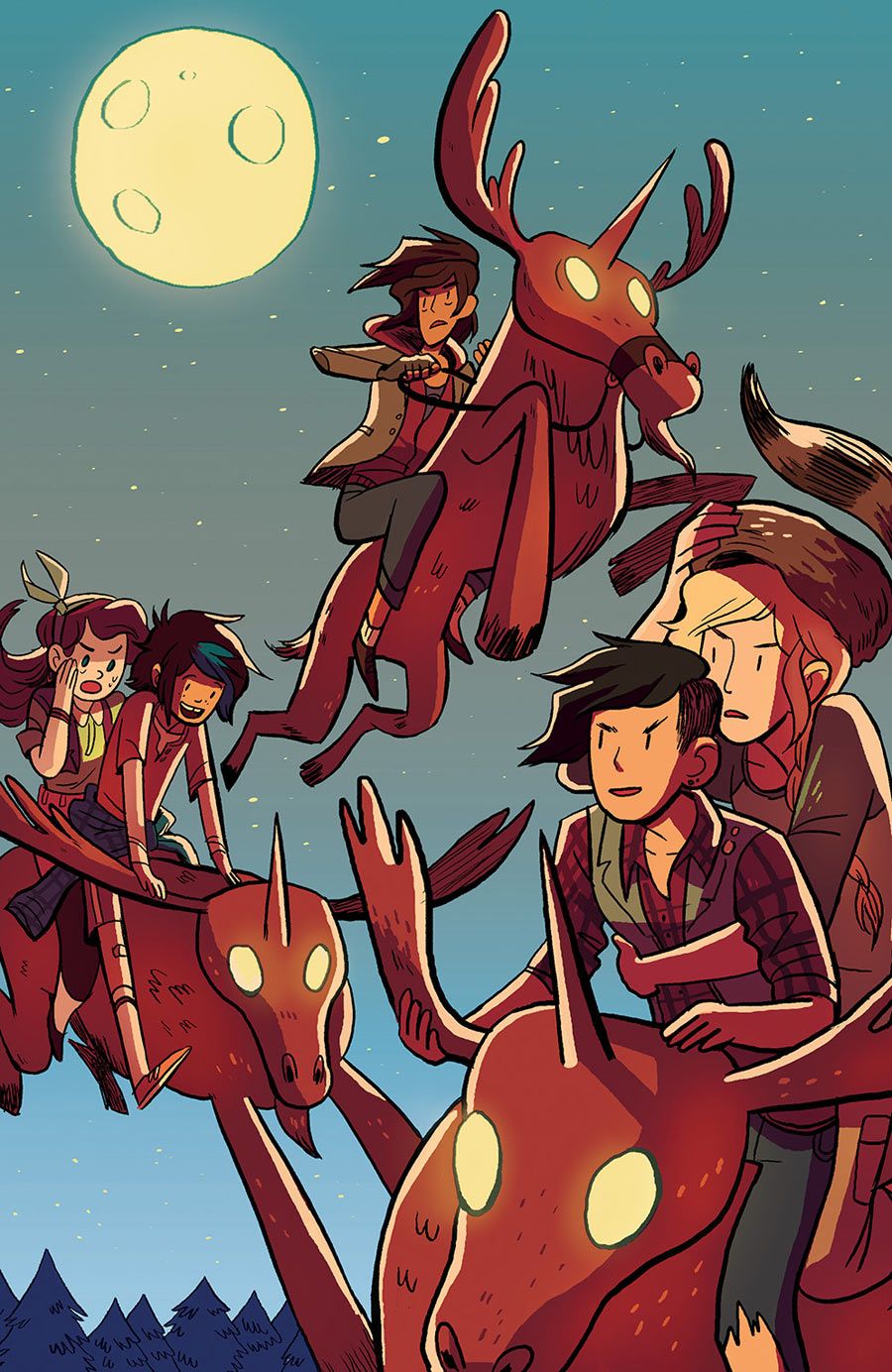Somebody yell "Timber!" because the "Lumberjanes" are ready to chop. But instead of slicing down trees, these teens will focus their energies on felling monsters, and maybe opening a few minds when it comes to what a comic can be.
Written by Noelle Stevenson and Grace Ellis with art by Brooke Allen, the April-debuting BOOM! Studios comic features a quintet of young female characters heading to summer camp where, in addition to dealing with the usual away-from-home related problems, find themselves facing off against monsters in the woods.
Part of the company's BOOM! Box imprint, "Lumberjanes" stars Jo (the leader), April (the brain), Mal (the sensitive punk), Molly (the stoic) and Ripley (the firecracker) as campers who thought they were heading into the woods for a simple sleepaway experience only to stumble into some supernatural shenanigans. While there, they meet counselor Jen and camp director Rosie, who fills out an intentionally well-rounded female cast.
As word of the book spread, female readers voiced their concern about pre-ordering "Lumberjanes" at their local comic shops, some of which can be less than inviting to new readers, particularly female ones. In response, Stevenson created a comic about her own negative experiences at such stores kicking off a lot of discussion online. All of this furthered Stevenson and Ellis' mission to help tear down what they see as unwritten "No Girls Allowed" signs still hanging in some corners of the industry and fandom.
CBR News spoke with Stevenson and Ellis about joining forces on "Lumberjanes," opening up the world of comics for new, female readers and promoting strong female comic characters in an environment that isn't always supportive of them.
CBR News: Was "Lumberjanes" something the three of you had been kicking around before BOOM! Box came into being? What made it a good fit for that imprint?
Noelle Stevenson: This is Grace and [BOOM! editor] Shannon [Watters]'s brain baby, and I'm super honored they brought me in on it, since it's like, everything I love.
Grace Ellis: Psh, obviously we brought you in on it. You're amazing.
Shannon and I started kicking around this idea probably about a year ago now, so as far as I know, BOOM! Box wasn't really a thing yet. That being said, I think it's a pretty ideal fit for "Lumberjanes" because it means we can do basically anything we want, because a) it's creator-owned and b) no one is expecting anything in particular besides a creative story.
Jo, April, Mal, Molly and Ripley sound pretty badass. Do they come to camp that way, or do they grow into their badassdom as the story progresses?
Stevenson: I think they were already badasses, but camp is like a training program for them where they learn to use their badassery for good.
In addition to the five leads, who else will readers meet in the first issue?
Stevenson: You'll meet Jen, their by-the-books counselor, who is not hardcore. She is my favorite. You'll also meet Rosie, the camp director, who is very hardcore. She is also my favorite. (They are all my favorite.)
Ellis: Jen and Rosie are the actual best, though. I'm so worried people aren't going to like Jen at all after the first issue because she's a fun-sucker, but you're going to have to trust me on this one.
The book features all kinds of supernatural elements. Were you more interested in tackling classic monsters, making your own or a combination of the two?
Ellis: For the most part, we're coming up with new monsters. I mean, yeah, we've definitely got some yetis and other familiar faces from lore, but I think the fun and interesting parts of the story involve new creatures because we get to make up the rules without as many limitations. Like, everyone has rough expectations of what Bigfoot looks like or sounds like, but if we have, say, a chipmunk that grows a fish tail during full moons, it's entirely up to us to decide how a were-mer-munk behaves.
Stevenson: Popular monster lore definitely affects the monsters that we write, but it's always more fun -- both to read and to write -- to reinvent them in some way. Like Grace said, it gives us more freedom to decide the rules of that monster.
It's implied that the five main characters were invited to the camp, which hints at intent from some kind of larger group. Is that addressed early on in the story?
Ellis: Yes and no. It will definitely be addressed in the full eight issues, but I think we're only talking around it in the first four. That aspect of the story is a tiny bit like "Buffy," but also not even remotely like "Buffy." Don't expect the Watcher's Council to pop out of a tree stump, is what I'm saying.
Summer camp is a great location for a monster story because it takes kids out of their normal circumstances and allows them to re-create themselves while also giving them a good deal of freedom. How important is that element to the story of "Lumberjanes?"
Ellis: This is a tricky question. Noelle, do you have any feelings?
Stevenson: I think camp definitely allows them to be more true to themselves. A few of them have complicated relationships with their families back home, but camp allows them to be more free and provides them with a different, surrogate family. At camp, the rest of the world doesn't matter. And like I said, even though they're already pretty hardcore, the things that they experience at camp help them realize exactly what they can do.
Did you all bring a lot of your own stories -- from camp or school or what have you -- into this book?
Ellis: My camp experiences were pretty terrible across the board, except for, like, high school band camp, so maybe not in a direct sense. I had to read a lot of how-to articles about canoeing, for example, which makes me feel like a super cool and interesting person. But a lot of the personality traits that the scouts are bringing to the table are based really roughly on people that I know. Noelle convinced me to inject some of my coming out story/feelings into one of the characters, so in a broader sense, I feel like I'm writing personal characters.
What made Brooke Allen the right artist for the book?
Stevenson: Have you seen her art?! It's amazing! There's so much energy in it, which makes it a perfect fit for a story about high-energy, mystery-solving preteens.
You've mentioned a lot of '80s and '90s elements as personal points of reference for this book, from the "Baby-Sitters Club" books and "Muppet Babies" to the Spice Girls and "Buffy." Do you think there are elements from those eras of pop culture not as present these days that you want to bring back in "Lumberjanes?"
Ellis: Ha! My first thought was that we were making those comparisons because we all have a bad case of 90s nostalgia, but now that I'm thinking about it, I think it's a fair point to bring up that 90s girl power stuff has kind of faded away from pop culture. I mean, Spice Girls-style girl power had more problems than I'd care to address just now, but it did launch an era of media that was unique if not nuanced in some of the ways it treated groups of women, "Muppet Babies" notwithstanding. I certainly wouldn't mind filling the "Buffy"/"Veronica Mars" void with our weirdo story about a diverse group of girls who put each other first, in a "Baby-Sitters Club" sort of way.
Stevenson: That's a really good point. "Girl power" definitely wasn't perfect -- it was usually pretty shallow -- but you'd think that media would have run with it and evolved by now, considering the popularity of stuff like "Buffy." Instead, it feels like we're seeing fewer female character-driven stories than ever. Hopefully "Lumberjanes" helps fill that gap in some people's lives.
"Lumberjanes" is packed with powerful female characters, from the stars to supporting characters like Rosie and Jen. Did that stem from a desire to see more female leads, was it an important story element, or is it a combination of both?
Stevenson: One of the biggest issues plaguing female characters is that, because there are relatively few of them, there isn't a lot of diversity, and the conversations around them push very specific traits as being "more feminist" -- typically masculine traits like physical strength, emotional toughness, etc. -- and there ends up not being a lot of room left for genuinely nuanced and organic female characters. Because when there's only one woman in the cast, she has to be everything for everyone, and that's not really possible. Every person is both strong and weak at the same time, and if you can't show that weakness and you can't show how there's lots of ways to be strong, you don't really have a real character. The best way I can figure to address that is to have way more female characters. Just, like, so many. Then it's not on one woman's shoulders to represent all women in a positive way. They can be heroes, villains, ambiguously moral, comic relief, femme, butch, strong, weak, etc. and what you've got are -- people.
Ellis: I completely agree. It seems so basic, but I really do feel like that's one of the reasons why "Lumberjanes" could be revolutionary: There are so many complicated women characters. Noelle and I were talking earlier about which characters we identify with the most, and it's a really difficult decision to make in this case because all the characters are so multi-dimensional, which is so rad and rare in a story about women. A large part of my background is in women's studies and script writing, so this project is a dream come true in a lot of ways.
It just seems so silly to me that there isn't a wider array of women in media because all you have to do is write more women who aren't in the story only because of men, so yes, this project is definitely an intentional effort to chip away at the mountains of cliched women in comics and media at large. I mean, the main point of the comic is that it's a good, interesting story, but I'm happy that we have the opportunity to tell it in a way that could help rip down the "No Girls Allowed" sign outside the comics clubhouse.
Speaking of which, Noelle, you recently had a comic about going to the comic shop make the rounds that sparked a lot of online conversation. Were you surprised by the reactions?
Stevenson: Ah, yep. I made that comic in reaction to seeing some people say that they wanted to pre-order "Lumberjanes" but they were scared of comic shops. It's something that's been bugging me for a long time. That said, I'm surprised it's actually news to anyone. "Breaking News: Woman Has Bad Experience at Comic Shop." People accused me of making it up, or speculated that it was made about experiences waaaay in the past, and just -- mhow did you not know this was happening? My experiences are relatively mild. I've heard horror stories from others. It's happening all the time, to so many people.
Grace, have you had similarly difficult comic store experiences?
Ellis: To be honest, before a couple of months ago, I hadn't had any comic store experiences at all. I was strictly but religiously a newspaper comic strip fan growing up, partly because there just wasn't a comic shop anywhere near where I grew up, and partly because I'm sure my ultra-conservative parents wouldn't have taken me there anyway, so I just never got into comic books as a kid. But now that I do read more comic books, my experiences have been a mixed bag. I don't go to the comic shop that's closest to my house because I've heard enough horror stories about that specific store to feel like it's not worth the pilgrimage just so I can support a store that doesn't really want me or other women there in the first place. I agree with everyone in this debate who's said that you really do just have to find the right store, which is embarrassing for me as someone who is actively encouraging women to engage with this industry.
You both represent an interesting section of the comics-making community these days in that neither of you were a die-hard fan growing up. It must offer a very different perspective on the medium and industry. Do you think that informs your work in "Lumberjanes?"
Stevenson: I was the kind of kid who was very interested in stuff that was "for boys" but still understood that they were "for boys." It was still a clubhouse where I wasn't really allowed. But I used to go to superhero movies with my dad all the time. He was a comic fan growing up, and that was my way of bonding with him. Still, even though I liked movies like "Spider-Man," I always knew they -- weren't really for me? I was allowed to go, but I wasn't allowed to be part of it. Mary Jane wasn't someone I wanted to be. The movies set her up as almost an obstacle for Peter Parker, someone who was in the way. I didn't want anything to do with her. And for a kid, that translates as, "I hate girls, it's better to be a boy." Which sucks.
And then, you know, I started getting involved more in comics, and webcomics, and I interned for BOOM! Studios, and I started realizing that there was so much more to comics than I had thought. Webcomics is filled with female creators, and BOOM! works hard to bring in female talent and have diversity among its employees. I had more role models and mentors who were female creators and editors, and I was exposed to way more comics with female protagonists. At around this time, the new wave of Marvel movies were coming out, and they started expanding their audience -- and the message they were sending was that this wasn't just for boys anymore. I mean, "Avengers" broke the box office, and a huge portion of its audience was female. Someone had reached a hand out to me, and it turned out, that's what I'd really been waiting for. Like I said in my comic, you know when you're not welcome, and if you're a girl, you're socialized to not want to intrude or rock the boat.
I'd always wanted comics and superheroes to be for me. That's why "Lumberjanes" is important. It says, "Look, comics are for you and me. You have a place here: Come in and make this place your own."
"Lumberjanes" #1, by Noelle Stevenson, Grace Ellis and Brooke Allen, debuts April 9.

